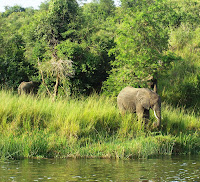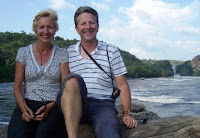
Last week we were able to visit Bollus Wembabazi, the headteacher who hosted me on my first visit to Uganda back in 2002 and who came to visit us in Essex in October 2005. Children from Stock may remember him visiting the school and he has an album full of pictures of the school – Geoff was interested to see how bright the (only just done then) playground markings were and the absence of the new buildings! We met his family, had a lovely local meal at his house and went on a walk round his farm (called a garden here – what we call a garden is called a compound). We thought it would be interesting to hear about his children’s activities as it gives a small insight into family life in Uganda.
He lives with his wife, Margaret, has 7 children of his own, looks after 2 orphans of his wife’s sister and hosts an old man. The oldest 2 children are twins of 22 years, called Irene and Collins. The next two are also twins, Daniel and Godwin, aged 18. His children are completed by Nelson, 16, Bridget, 13, and Noreen, 11. The orphans are Daphne, 16, and Douglas, 13. The old man, only ever called Muzee during our visit - a term of respect for an old man in Ugandan life - used to look after the garden of Bollus’s mother, but when she died 4 years ago he was made homeless and so Bollus now looks after him. Incidentally Geoff is often called Muzee, which he finds difficult to come to terms with!
They live in a traditional home which was built by Bollus using home-made bricks with corrugated iron sheets for a roof. It has a living area and sleeping areas. There is an outside kitchen made from a wooden framework and covered in local mud from the farm with a thatched roof. The pit latrine is set about 20 metres from the house and is made in a similar way to the kitchen.
Bollus has worked at 5 schools since 2002. The moves have been for 3 reasons; Firstly due to conflicts with the local community, secondly by the district in order to fill more rural schools, and thirdly so Bollus could work at a school nearer his home. These 3 reasons are common across Uganda and mean that there more movement of headteachers than is good for school stability.
Margaret has been a local politician and is currently the treasurer of her local primary school. She wanted to go further in politics but is not well educated enough. She only made Primary 4, because her mother died and she had to leave school to look after her younger siblings.
Irene is very hard working and after taking A levels, she went on to do a secondary teaching diploma, which she has just completed. She is awaiting the final results and is working as a matron in a girls boarding school (where she did a teaching practice), before applying for jobs.
Collins also did well in his A levels – well enough to be able to go to university to do engineering as fee-paying student but not quite well enough to get a government scholarship. Bollus wanted him to do teaching diploma as he could not afford degree fees, but Collins refused and left home – teenagers are the same everywhere regarding their parents’ wishes!
Daniel left school before O levels so works on the farm. Bollus has bought him two oxen so he can set up a ploughing business and he has built a home on the farm where he lives with his pregnant wife.
Godwin is mentally handicapped and the family looks after him at home.
Nelson is at the local government secondary school, but with classes of 90, Bollus is unhappy with the quality of teaching and is keen for Nelson to attend a private school. Nelson however is happy to stay with his friends in the local school!
Bridget did well in her primary leaving exams last year, but again not well enough to get into a ‘good’ secondary school. Her parents say this is because she is ‘playful’. She is repeating her year at a local private school as government schools are not supposed to allow children to repeat the final year of primary education.
Noreen is just chugging along in Primary 4, content to keep her head down and let her older siblings take the parental flak.
As we re-read this we realise the difficulties faced by government schools when even goverment headteachers are not keen on using them for their children! It makes us even more determined to improve the quality of the schools used by most children.
After lunch and a photograph session, we all went for a walk around the 10 acre farm. They grow maize, beans, cassava, matoke (a type of banana), cabbages, pumpkins, coffee and groundnuts. They also keep pigs, chickens and goats. What they produce is mainly used to sell to supplement their income from his teaching job after they have eaten their needs. Sabrina was particularly

excited by the cabbage seed bed and got some seedlings to take home and grow on in her plant pots. They have been planted and are doing well.








 Whilst visiting Bollus near Masindi, we managed to fit in a trip to Murchison Falls National Park and went on a boat trip up the Nile to the base of the Falls, an early morning game drive and a walk to the top of the Falls. Here are some of the animals we saw as well.
Whilst visiting Bollus near Masindi, we managed to fit in a trip to Murchison Falls National Park and went on a boat trip up the Nile to the base of the Falls, an early morning game drive and a walk to the top of the Falls. Here are some of the animals we saw as well.







